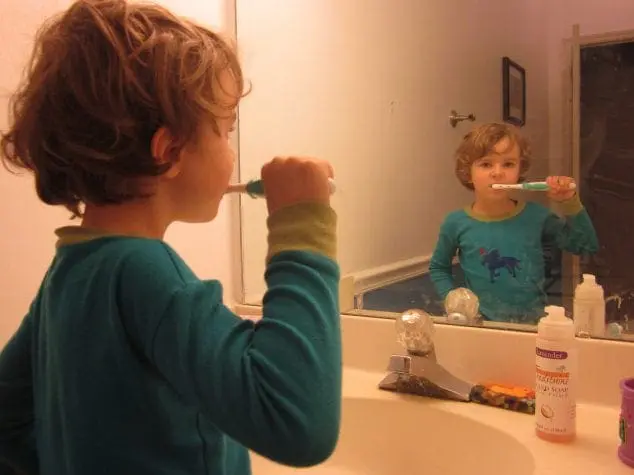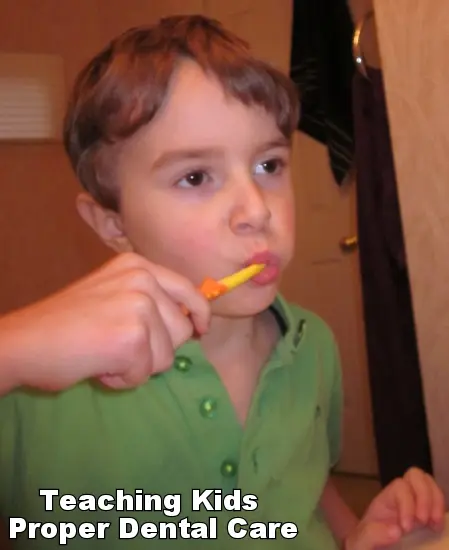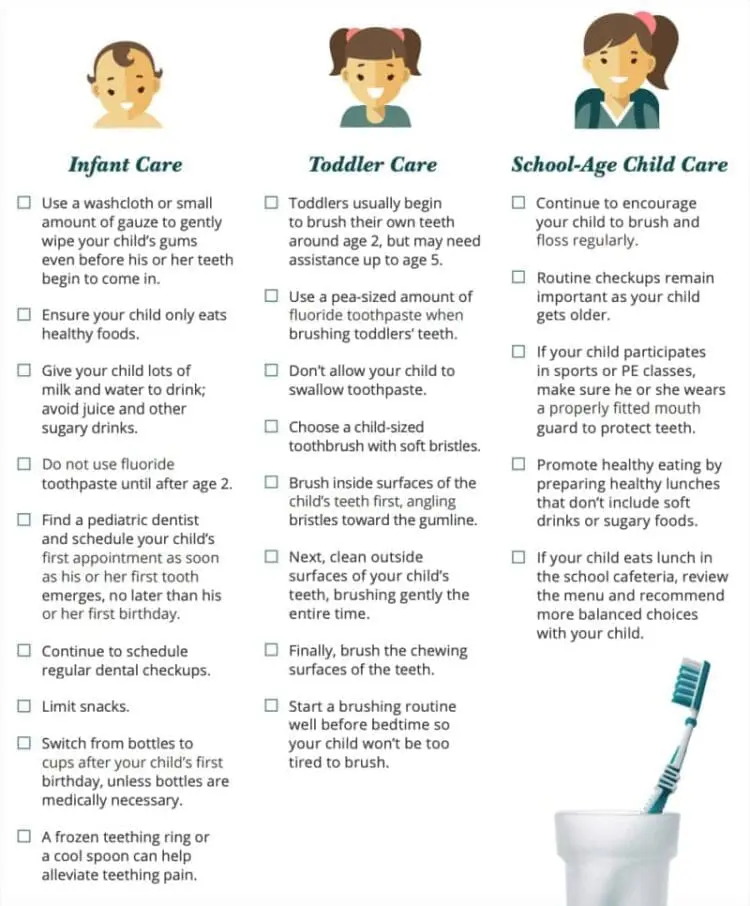Few kids know how to properly take care of their teeth, and fewer actually enjoy it. Since oral health has such a profound impact on a person’s overall health, it’s important to know how you can care for your little ones teeth before they can do it on their own. This will help set them up for a healthy, long life and excellent oral hygiene habits. Here are some tips on proper dental care for kids and toddlers so you can build a healthy routine. I have also included some strategies for teaching kids how to take proper care of their teeth and making it fun to do so.
Dr. Paul J. McConnell, Dental Director, of UnitedHealthcare points out that, “To help encourage a healthy smile and healthy mouth for people of all ages, it’s important to brush and floss daily – and see your dentist at least every six months for preventive care that most dental plans cover with no cost sharing.” You can find a pediatric dentist near you at aapd.org
It is so important to instill good dental habits in your kids. Teaching children how to brush and floss properly not only protects their oral health but it is also an indicator for overall health. Additionally, learning good oral care habits teaches them responsibility. One of the most important parts of good kids dental care is follow up from parents! So, let’s dive in and discover how you can start safeguarding their beautiful smile starting today.

How To Brush Toddler Teeth
- Brushing should begin when their teeth erupt through the gums
- Use a pea-size amount of fluoride-free baby toothpaste (fluoride free because they won’t master spitting at first)
- With a soft bristled toothbrush, use gentle back and forth strokes angled toward the gumline on the inside surfaces of their teeth
- Once you’ve brushed inside, continue to gently brush the outside surfaces with bristles angled up and down in relation to the gumline
- Finally, brush back and forth along the chewing surfaces
There are plenty of options out there for natural toothpaste, toothbrush, flavored floss, and more. When teaching your toddler to take care of their teeth, you’ll probably want to make it as fun as possible to hold their interest. Let them pick out a cartoon character toothbrush or invest in one that plays music for 2 minutes (the amount of time they should spend brushing). Familiarize them with going to the dentist by reading them stories and keeping the experience positive and fun.
4 Tips To Build A Healthy Brushing Habit For Kids

Make a routine
A routine for caring for your children’s teeth can start when they’re babies, by wiping down their gums with a clean cloth after feedings. As they grow into toddlers and teeth appear, exchange the cloth for small toothbrushes to use twice daily.
As toddlers grow into preschoolers and beyond, you’ve already established that brushing their teeth is part of your family’s everyday routine. Make sure that your children brush their teeth twice a day, preferably in the morning and evening, and that they practice flossing in between teeth. As your kids grow older, schedule visits to the dentist twice a year for regular cleanings and checkups.
Explain Why
Kids need to know that taking care of their teeth is important, and that there are long-term consequences if they don’t. My boys – ages eight and five – love to hear about how when they eat, bacteria come out to play on their teeth, building plaque that turns to acid. It’s the acid that eats away at their teeth, rotting them and making them fall out. My kids imagine that they’re superheroes, fighting plaque with all their might! This explanation might work for your kids too, but if it doesn’t, find one that helps explain why taking care of their teeth is important. Teaching kids how to take proper care of their teeth is much easier when they understand why and are motivated to help you.
Let Your Child Choose
It’s fun to have a variety of products for kids to choose from when it comes to taking care of their teeth. Have two or three toothbrushes available, and allow your child to choose which toothbrush they want to use when it’s time to brush their teeth. You may even want to try an electric toothbrush for kids as they help with the brush strokes and getting teeth super clean.
Other kid-friendly products to consider include plastic cups for rinsing, different colors of floss, and a variety of toothpaste flavors. Let your child put the toothpaste on the brush (emphasizing that the toothpaste should be the size of a pea), and then have your child choose who starts brushing his/her teeth first if you’re taking turns.
Supervise When Teaching Kids How to Take Proper Care of Their Teeth
Once they have enough dexterity to hold their brush—let them! I would love it if my children could brush their teeth on their own…but they can’t. They’re not able to reach those tight spaces where plaque has their parties, and kids don’t take the time necessary to properly brush their teeth. One way that works well for my kids is if I brush their teeth for fifteen seconds, and then they have a turn. After taking turns brushing a couple of times, we take turns flossing their teeth.
As they get older and better at it you can make sure they know what to to by watching them do it. Make sure kids brush for a full two minutes, using short, gentle strokes. See if they are keeping the toothbrush head at a 45-degree angle to the gums. These proper dental care techniques are important both to help prevent cavities and to support gum health.
- Show them the correct way to floss. Hand held flossers make it easier to control for little hands or try a water flosser.
- Be consistent—Make it routine to brush at least twice a day
- Floss daily and use a natural mouthwash daily as well
- Replace toothbrush (or toothbrush head) every 3 months
Eventually, after watching your child brush their teeth and inspecting the results, you will feel comfortable letting them brush and floss themselves. Trusting your child is important for their self esteem and for your relationship. However, don’t just assume they can do such an important task all by themselves without a little follow up. They may need help following directions. Check up on your child every once in a while. Sometimes, just pop into the bathroom and check on the progress. Sometimes, inspect their teeth afterwards to make sure they are getting their teeth really clean. Other times, just check verbally. Varying your follow up techniques will keep them guessing and keep it from becoming a nagging thing.
Kids Dental Care Checklist

The above kids dental care checklist was provided by Natomas Crossing Dental Care. It makes a great visual to print out and stay on track with oral care health. Here is the link for a printable pdf.
More Little-Known Secrets to Preventing Childhood Cavities
Are you tired of battling your child’s dental cavities? You’re not alone. In fact, according to the Centers for Disease Control and Prevention, tooth decay is the most common chronic disease among children in the United States, affecting about 20% of kids aged 5 to 11 and nearly 14% of adolescents aged 12 to 19. As a parent, it’s natural to worry about the health of your child’s teeth and the impacts it may have on their overall well-being. But fear not! In this article, we will provide you with expert-approved strategies to shield your child’s teeth from the dreaded cavities. From the role of diet and oral hygiene habits, to the importance of regular dental check-ups and tips for encouraging good oral health habits, this article will equip you with the knowledge and tools to ensure a cavity-free future for your child.
The Role of Diet in Preventing Cavities
The role of diet plays a crucial part in preventing cavities in children. Sugary and acidic foods and beverages are the main culprits when it comes to cavities. The bacteria in the mouth feed on these sugars and produce acids that attack the tooth enamel, leading to decay. Limiting your child’s intake of sugary treats, sodas, fruit juices, and even some seemingly healthy snacks like dried fruits or granola bars can go a long way in preventing cavities. Instead, try calcium-rich foods like milk, cheese, and yogurt are particularly beneficial as they help strengthen tooth enamel and neutralize acids in the mouth.
In addition to making healthier food choices, it’s important to be mindful of how often your child eats. Frequent snacking or sipping on sugary or acidic beverages throughout the day exposes their teeth to prolonged acid attacks, increasing the risk of cavities. Encourage regular meal times and limit snacks to certain times of the day, avoiding constant exposure to harmful substances. Furthermore, promoting good oral health habits after eating is essential. Encourage your child to rinse their mouth with water or chew sugar-free gum to stimulate saliva production, which helps wash away food particles and neutralize acids.
By being mindful of your child’s diet and promoting healthy eating habits, you can significantly reduce their risk of developing cavities. Remember, prevention is key, and a well-balanced diet is an important piece of the puzzle to ensure a lifetime of healthy smiles for your little ones. With that in mind, let’s now explore the next section and delve into the oral hygiene habits that can help your child maintain a cavity-free smile.
Oral Hygiene Habits for a Cavity-Free Smile
Promoting good oral hygiene habits not only includes being mindful of your child’s diet but also encompasses taking preventative measures after meals. It’s worth noting that brushing their teeth immediately after eating should be avoided, as waiting at least 30 minutes allows saliva to do its job and prevent any potential damage to softened enamel.
Good oral hygiene habits that can help your child maintain a cavity-free smile. By instilling the habit of brushing their teeth twice a day into your child’s daily routine, you will be doing them a life long favor. By teaching them to floss once a day, you will be helping them learn to prevent cavities that can otherwise develop between their teeth.
The Importance of Regular Dental Check-ups
Regular dental check-ups play a vital role in ensuring optimal oral health for your child. Just like adults, children should visit the dentist regularly to monitor their dental development and detect any potential issues early on. These check-ups are essential for maintaining a cavity-free smile and preventing more serious dental problems down the line.
During a dental check-up, pediatric dentists will thoroughly examine your child’s baby teeth and gums, looking for signs of cavities, gum disease, or any other dental issues. They may also perform a professional cleaning to remove plaque and tartar buildup that regular brushing and flossing might have missed. The dentist can also provide personalized advice on good dental hygiene techniques, including brushing and flossing, tailored to your child’s needs.
In addition to assessing your child’s dental health, regular check-ups also offer the opportunity to address any concerns or questions you may have as a parent. The dentist can provide guidance on teething, pacifier use, thumb sucking, and other common concerns related to your child’s oral health. They can also offer advice on nutrition and dietary habits that affect dental health, further reinforcing the importance of a well-balanced diet for cavity prevention.
By bringing your child to regular dental check-ups, you are not only taking a proactive approach to their oral health but also instilling good dental habits early on. These dental visits create a positive association with the dentist, helping to alleviate any anxiety or fear your child may have about dental appointments. Regular check-ups establish a foundation of trust between your child and their dental office, making it easier for them to comply with future dental treatments or suggestions for improving their oral hygiene.
Conclusion
My husband always tells my kids, “Only brush the ones you want to keep!”
Showing your toddler the proper dental care for kids instills a healthy habit they can carry with them through adulthood. They’ll eventually become more independent and won’t have someone to remind them, so it’s good to start when that first front tooth peeks its way through. I hope you found these toddler dental care tips useful. Teaching kids how to take proper care of their teeth is something you will be thankful for next time you visit your dentist and save yourself a huge bill on fixing cavities. It is worth the time and hopefully these tips will help make teaching kids how to take proper care of their teeth more fun. Do you have any experiences with this you would like to share?
Related Posts:
Kid’s Spry Tooth Gel with Xylitol: Protect your Child’s Smile Today
